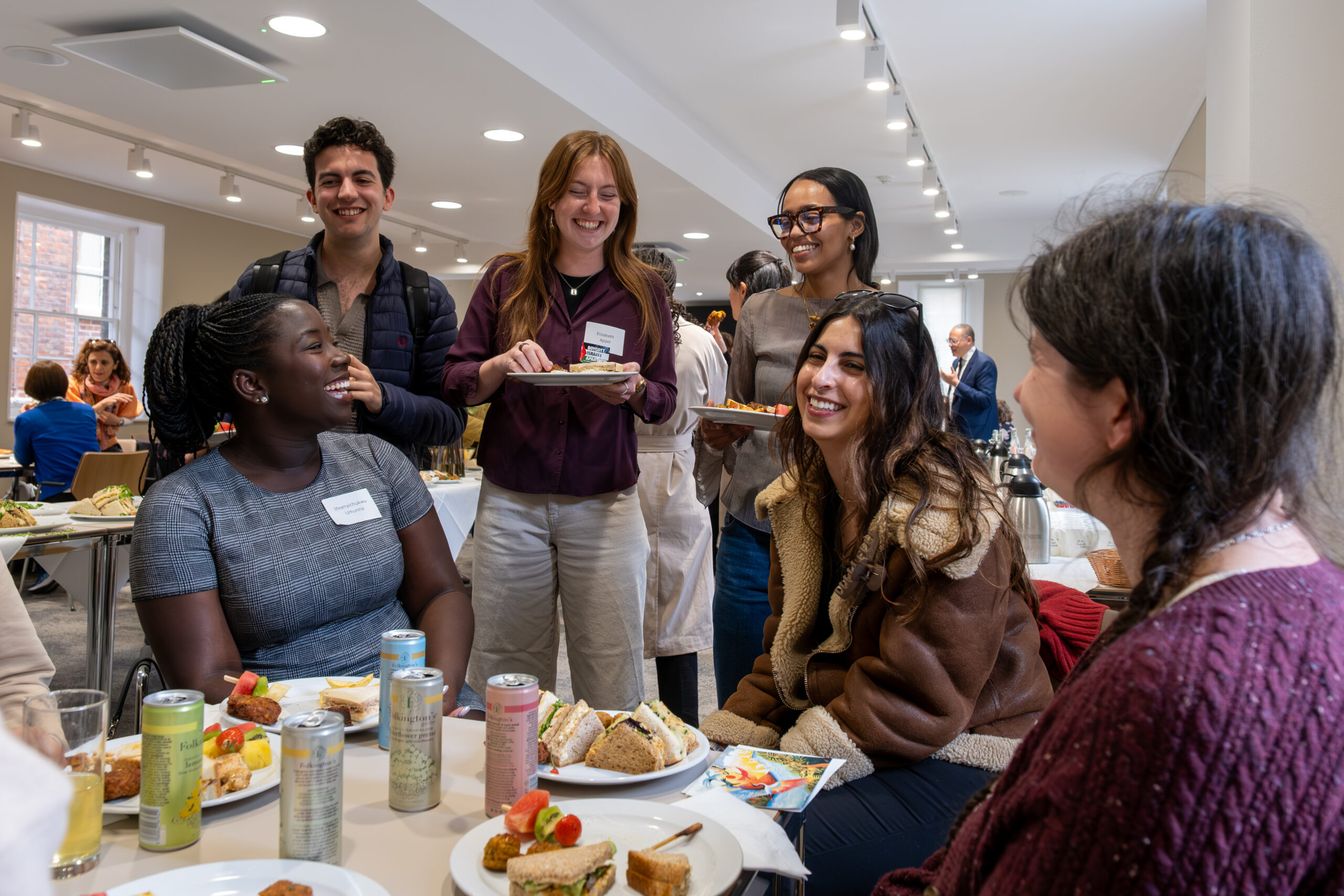
Gates Cambridge celebrated its 25th anniversary last week with a day of events, insights and discussion.
At the heart of the ripple effect is creative disruption - that time spent at Cambridge which gives students the time to think deeply about their subjects and to engage with their fellow scholars, to listen and learn, to absorb themselves in the world of ideas and innovation that is the lifeblood of Cambridge.
Professor Eilis Ferran
Gates Cambridge celebrated its 25th anniversary last week with a focus on what current scholars are doing, a look at the impact our alumni have made and a wide-ranging discussion on the role of international scholarship programmes now and in the future.
The morning began with a video focused on our eight Impact Prize winners. They spoke about the ripple effect – the impact the scholarship had on their studies and the impressive work they have gone on to do that is changing the world in ways we could never have predicted.
The Impact Prize winners – Professor Urbasi Sinha [2002], Alex Vail [2010], Alexandra Grigore [2012], Mona Jebril [2012], Emily Kassie [2016], Emma Houiellebecq [2016/2021], Anoop Tripathi [2022] and Uchechukwu Ogechukwu [2024]– have made a difference in so many ways – whether as film directors, wildlife cinematographers, quantum physicists, solar power entrepreneurs, plant scientists, emergency aid workers, healthcare innovators or education experts.
Following the film six scholars took part in a Research Highlights session, outlining their research across a wide range of subjects and giving us an insight into their studies and why these matter.
Scholars spoke about everything from the emotions involved in expert responses to the repatriation of archaeological relics, carbon capture using imperfect graphene and how to get children back to school in Pakistan to potential treatment targets for Covid variants, medieval witch trials and ancient snakes.
Madalyn Grant [2024] spoke about why archaeologists aren’t neutral about repatriation and the need to rework objectivity as a form of passion. “To remain detached requires effort; it’s not passive; it’s a form of passion,” she said.
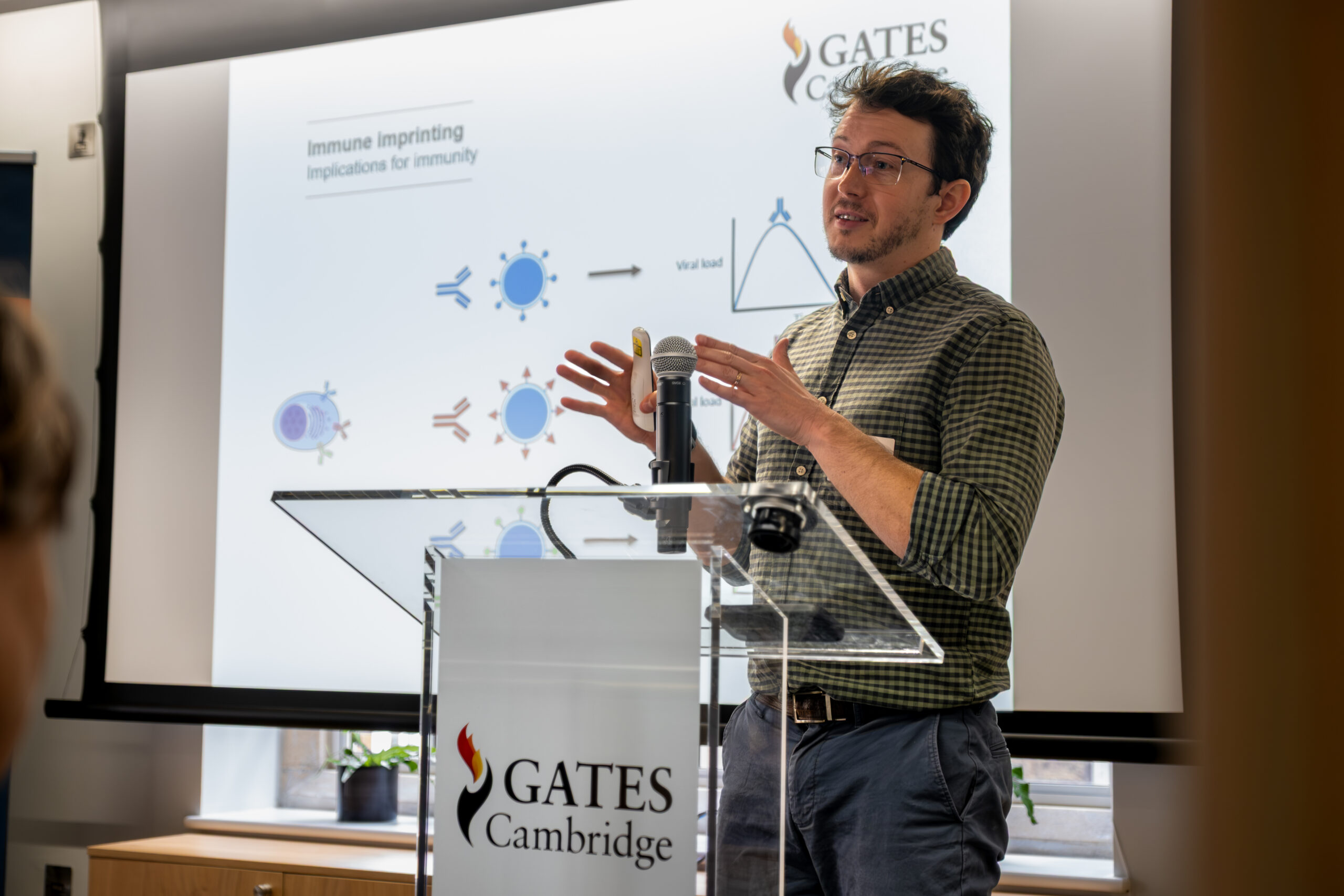 Daniel Egan [2022, pictured left] discussed the role of spike proteins in Covid variants, how variants can cause delays in effective immune responses and why membrane proteins may be good targets for vaccines as, unlike spike proteins, they don’t change.
Daniel Egan [2022, pictured left] discussed the role of spike proteins in Covid variants, how variants can cause delays in effective immune responses and why membrane proteins may be good targets for vaccines as, unlike spike proteins, they don’t change.
Minha Khan [2023] spoke about why we need to understand why Pakistan has such a crisis with school attendance, who it affects and how. Her research suggests that an enrolment-only approach won’t work as inequality is the root cause.
Inioluwa Popoola [2023] showed how tests show CO2 and water bind better on imperfect graphene surfaces, aiding carbon capture. “There is strength and beauty in imperfection,” she said.
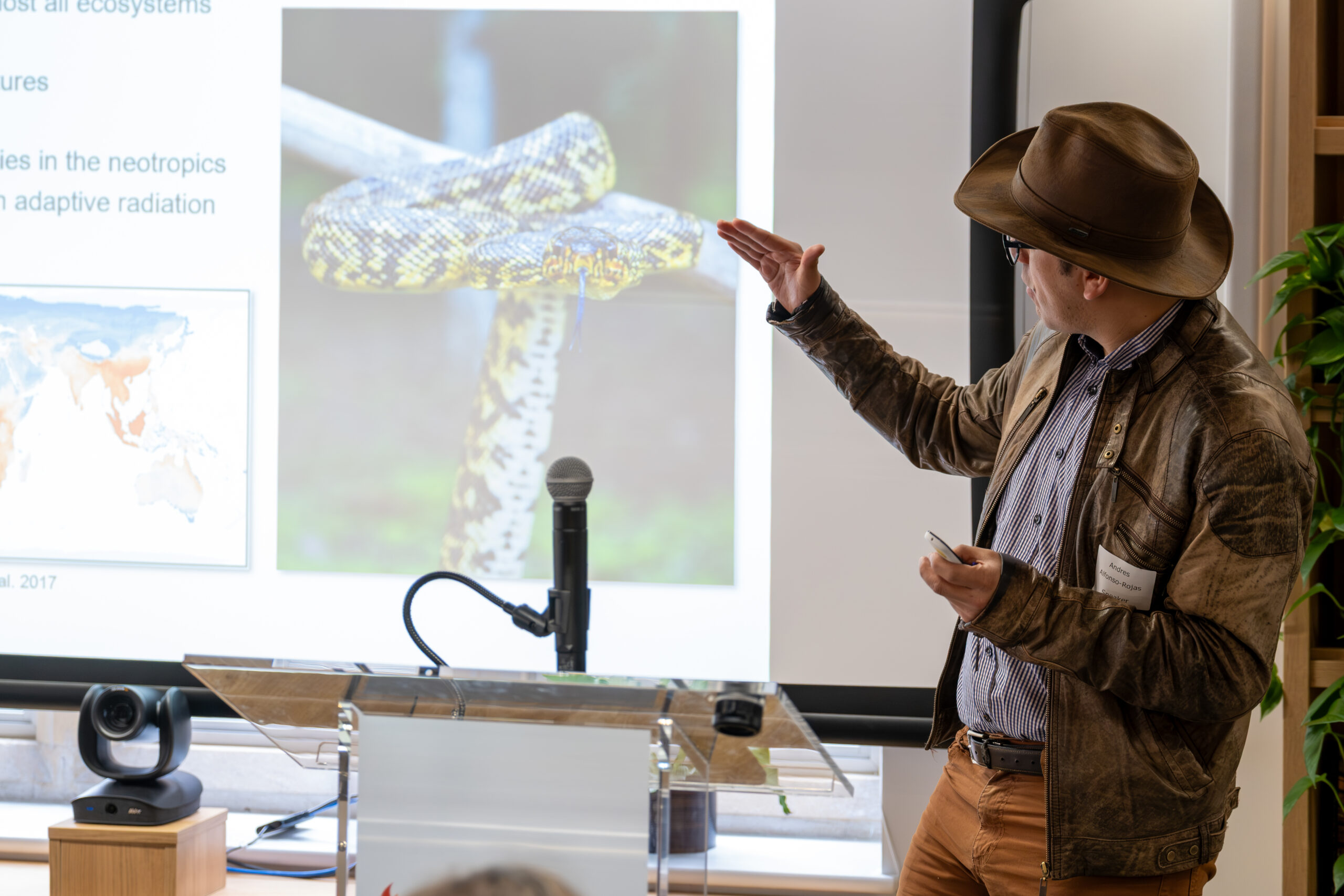 Larissa de Freitas Lyth [2022] spoke about the emergence of witch trials in the Middle Ages, the links between the treatment of witches and heretics and how black cats and Devil worship became signs of witchcraft – and also why witches weren’t all women.
Larissa de Freitas Lyth [2022] spoke about the emergence of witch trials in the Middle Ages, the links between the treatment of witches and heretics and how black cats and Devil worship became signs of witchcraft – and also why witches weren’t all women.
And Andres Alfonso Rojas [2022, pictured right] spoke about his work on anaconda fossils, why anacondas haven’t changed size over millennia, why they didn’t become extinct and how snake archaeology has boosted tourism in parts of Colombia.
International scholarships: past, present and future
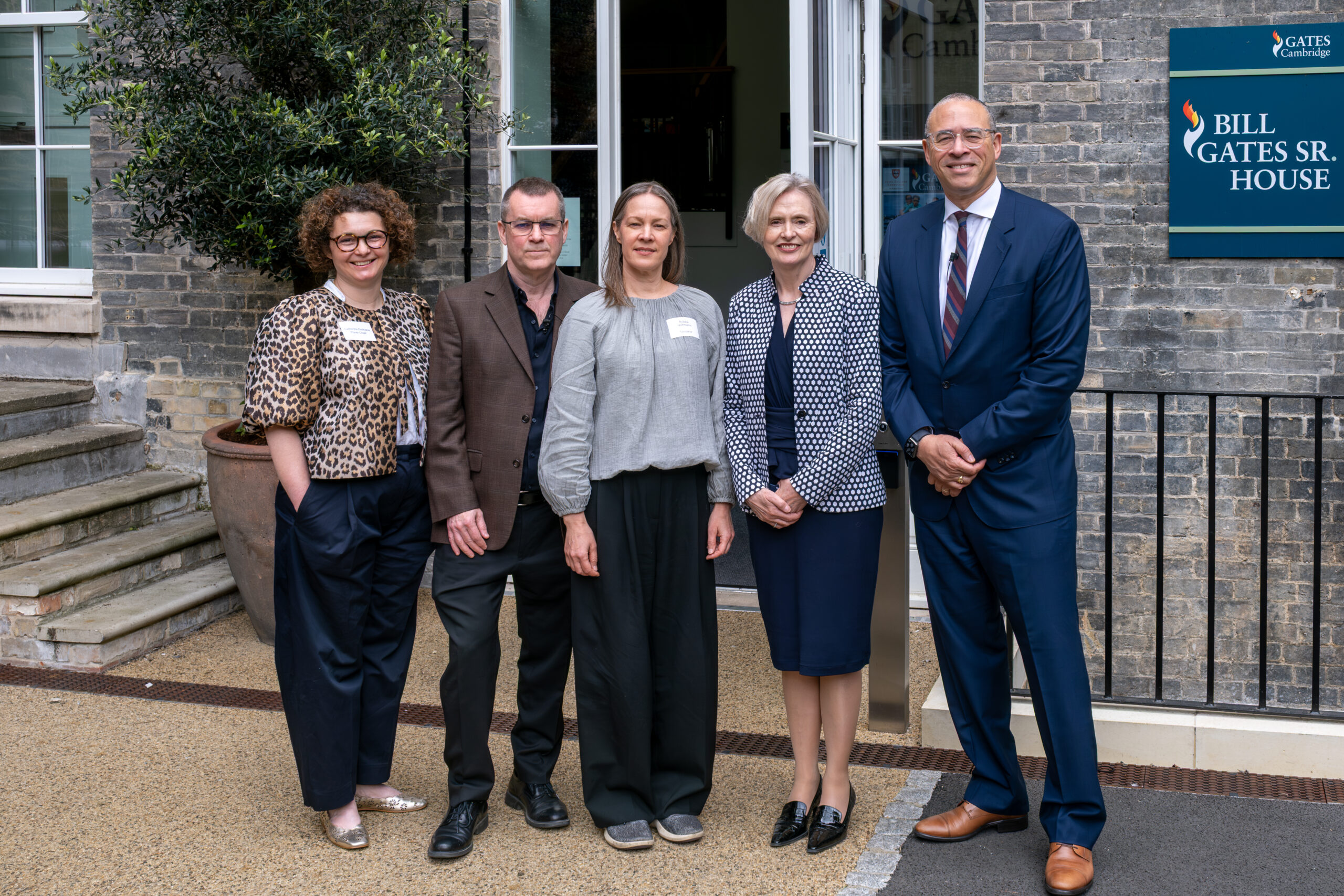 The Research Highlights session was followed by a panel discussion about the importance of international scholarships like Gates Cambridge, with Professor Riikka Hofmann from the first 2001 cohort who is now an interviewer on the social sciences panel, Dr Jonathan Holloway, president of Rutgers and a Gates Cambridge Trustee, Brendan O’Malley, editor-in-chief of University World News, and Gates Cambridge Provost Professor Eilis Ferran. The discussion covered everything from the benefits of international student perspectives on the huge challenges the world faces to what makes Gates Cambridge scholars unique.
The Research Highlights session was followed by a panel discussion about the importance of international scholarships like Gates Cambridge, with Professor Riikka Hofmann from the first 2001 cohort who is now an interviewer on the social sciences panel, Dr Jonathan Holloway, president of Rutgers and a Gates Cambridge Trustee, Brendan O’Malley, editor-in-chief of University World News, and Gates Cambridge Provost Professor Eilis Ferran. The discussion covered everything from the benefits of international student perspectives on the huge challenges the world faces to what makes Gates Cambridge scholars unique.
Brendan O’Malley spoke of the growth of international student recruitment in recent decades and the impact of various geopolitical tensions combined with right wing regimes that are hostile to higher education as well as government responses to immigration concerns. Dr Holloway said he no longer recognised his country and spoke of an assault on higher education, innovation and ideas. He said being open to international scholars is essential if higher education institutions want to be of service to the world and solve the complicated problems it faces, adding that it is vital to prepare students from all backgrounds to be global citizens.
Professor Hofmann spoke of how she felt she could reach out to her Gates Cambridge network at any time, even years later, knowing they would be there and that they shared her desire not only to understand the world but to change it. Eilis Ferran spoke of the two major qualities of Gates Cambridge Scholars – confidence in their ability to make a positive impact and the humility to listen, to build on what others have achieved and to see improving the world as a continuous step by step process. Professor Hofmann said selecting scholars was a tough process as many wanted to change the world for the better. She was looking for people with a combination of desire and stamina, an interest in working for others and not just to build their personal reputation and for brave people who can make others people around them be brave too.
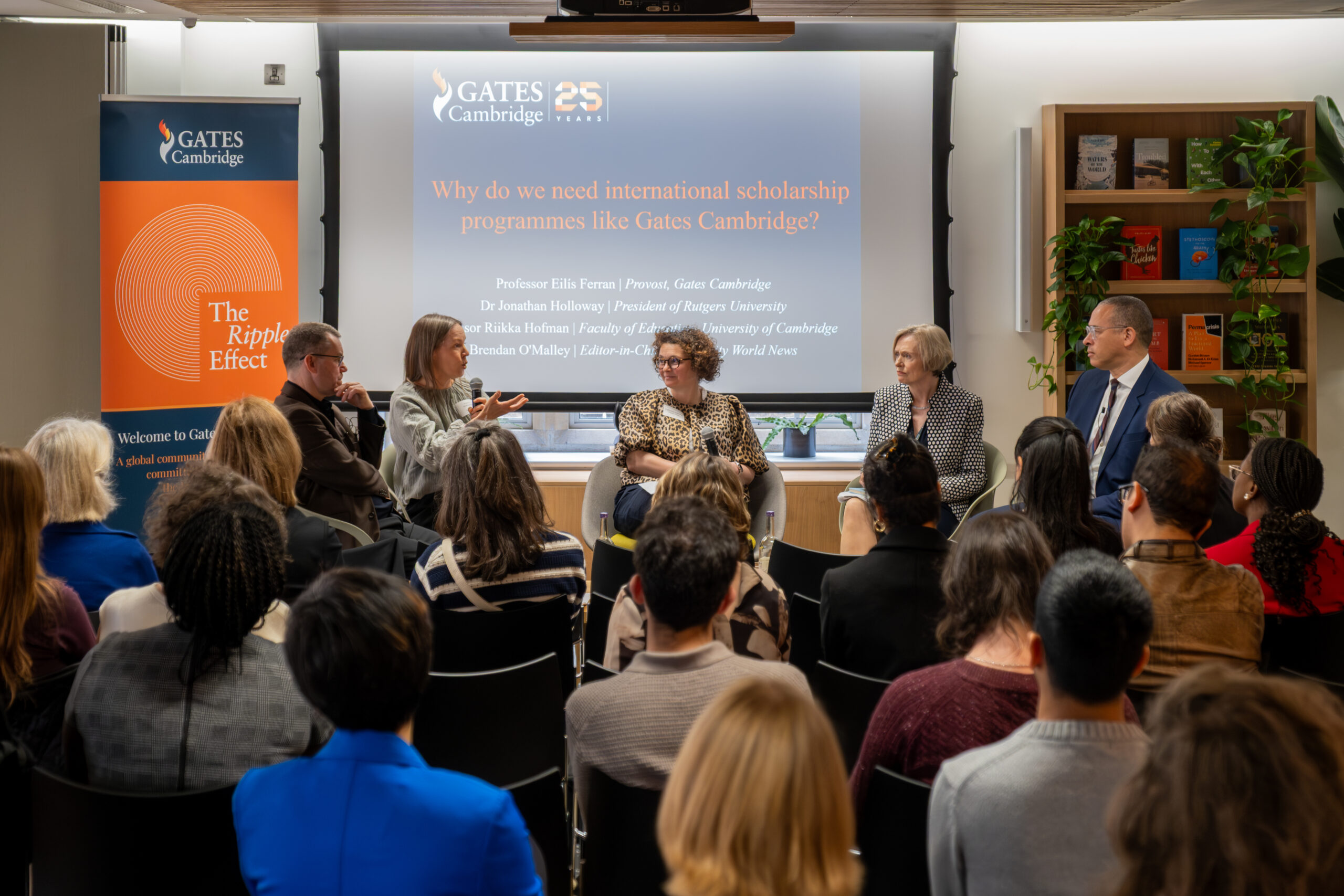 The panel spoke about the impact of aid cuts on higher education, especially the recent USAID cuts on higher education in the Global South. O’Malley said 80% of aid money for higher education went to scholarships and talked of the devastating impact on students worldwide of its withdrawal. Dr Holloway said there had been a rise in recent years of scholarship funders placing constraints on what students could study. Ferran said that one of the remarkable things about Gates Cambridge is that no conditions were put on what scholars can study. The 25th anniversary aimed to capture the ripple effect that this had had in so many areas and how it had fostered originality and innovation.
The panel spoke about the impact of aid cuts on higher education, especially the recent USAID cuts on higher education in the Global South. O’Malley said 80% of aid money for higher education went to scholarships and talked of the devastating impact on students worldwide of its withdrawal. Dr Holloway said there had been a rise in recent years of scholarship funders placing constraints on what students could study. Ferran said that one of the remarkable things about Gates Cambridge is that no conditions were put on what scholars can study. The 25th anniversary aimed to capture the ripple effect that this had had in so many areas and how it had fostered originality and innovation.
The panel also discussed how scholarships can work together in the future and reach out to more people, particularly those who might not feel they belong at prestigious universities like Cambridge, and how we can support them better. O’Malley talked of the need for scholarships to tackle inequality, for instance, by doing more to help students in refugee camps. Ferran spoke of the work to encourage more philanthropists to invest in human potential and what she called ‘patient capital’ that is tailored to the needs of different communities around the world.
The day culminated in a graduation dinner at Murray Edwards College, amid their extensive collection of women’s art, and the announcement of this year’s Bill Gates Sr Prize winners – Anwesha Lahiri [2021] and Stanley Onyemechalu [2021]. Eilis Ferran reinforced the message of the ripple effect. She said: “At the heart of the ripple effect is creative disruption – that time spent at Cambridge which gives students the time to think deeply about their subjects and to engage with their fellow scholars, to listen and learn, to absorb themselves in the world of ideas and innovation that is the lifeblood of Cambridge.”
Picture credit: Julian Peters












